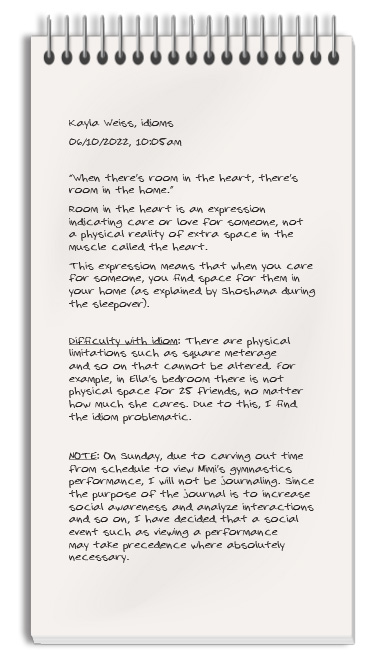Normal: Chapter 56
| January 17, 2023“If I would have accepted your invitation to stay overnight,” Kayla asks with interest, “where would I have slept?”

E
lla’s room is large, bigger than any of their bedrooms, but with the high riser’s second bed pulled out and two extra mattresses on the floor, it’s starting to feel crowded.
“If I would have accepted your invitation to stay overnight,” Kayla asks with interest, “where would I have slept?”
“Oh, we would have figured it out,” Ella says easily.
“When there’s room in the heart…” Tzippy sings out. She’s sitting cross-legged on the floor, holding her head very still while Shoshana irons her curls.
Kayla looks confused. “Are you referring to the heart, as in the cardiovascular muscle, or something else?”
Mimi has an urge to laugh, but Shoshana, bless her, explains what Tzippy meant, and Kayla nods seriously.
“In any case, I will have to leave shortly, in order to have sufficient sleep,” Kayla tells them. “And you should, too. At our age, research shows that it’s necessary to have eight to ten hours of sleep per night.”
“Eight to ten!” Tzippy sounds horrified. “I mean, that’s like double what I get!”
“That isn’t safe,” Kayla informs her. “Having too little sleep leads to health complications such as—”
“Can you tell us after tonight?” Ella asks, with a mock groan.
Kayla stares at her. “I don’t really see the point of that.”
“Time for a change of subject,” Shoshana says.
Kayla looks at her watch briefly, and shrugs.
“Tell me.” Mimi props herself up on her elbow and looks around. In the dimness, three faces are turned to hers expectantly. It’s that delicious time of night when the world is a bubble; it’s just the four of them and the circle of soft yellow light from Ella’s nightlight. Kayla left hours ago, and they’re almost ready to go to sleep. Almost, but not quite. “What is normal? What does it even mean?”
Tzippy, nearest to her, looks confused.
“I’m talking about Kayla. You know. Like, how she is socially. And I’m thinking about how we call some people normal and others… you know… not. But why? What does it mean? How do you define it?”
“Isn’t normal just about fitting in with the crowd? When in Rome, do as Rome does?” Ella’s all for keeping things simple.
“I don’t know,” Shoshana says thoughtfully. “What about people blindly following the crowd when it’s totally the wrong thing to do? Like the Nazis all saying afterwards that they were just following orders. Does that make murdering people normal?”
“Right. And the few people who saved Jews during the Holocaust — they weren’t the majority. They weren’t following the crowd at all, but they’re the normal ones.”
“Maybe not. Maybe they’re extraordinary.”
“It’s normal to do what everyone does.”
“Well, for most people, at least.”
Mimi watches her friends as the conversation volleys between them. “Wow, didn’t realize my question was so deep,” she says.
Ella fluffs her pillow. “I’m not sure why we’re getting so complicated. Being socially ‘on’ is normal. That’s all. No?”
“But what do you mean by ‘socially on’?” Shoshana challenges. “Isn’t there a time and place to be different? To stand apart?”
“Well, there are different ways to stand apart,” Tzippy says. “Like Mimi and her gymnastics. That’s a ‘socially on’ way to stand apart.”
“Doing what’s expected by the social group that you’re part of,” Ella says. “Like the way you act with friends is different from how you act with a teacher, or with your grandparents.”
“Adjusting your behavior to social context is a skill, not a definition of normal,” Shoshana argues.
Mimi’s head starts to spin. “Oh my, this is getting too complicated for three a.m..”
Tzippy talks as if she hasn’t said anything. “Is it always about doing what’s expected? Really? Like, what if your friends expect you to do something that isn’t comfortable for you?”
The room goes quiet.
“Are you… talking about something specific?” Shoshana asks, finally.
Tzippy sits up. She doesn’t look like herself, with her hair lying in a perfect, straight sheet over her shoulders. “I guess so. You know. Because sometimes, friends expect you to… share things. And you don’t want to. Or you can’t.”
Mimi nods. Shoshana bites her lip.
Tzippy speaks, all in a rush. “I felt bad, before Pesach, when I kept cancelling on all of you. But there was something going on… I didn’t want to say. I couldn’t say. And to be honest, I still can’t. It’s not relevant anymore, but it wasn’t — it wasn’t my business to share. So even though I knew it looked strange, it didn’t look normal to be all, y’know, secretive and keep backing out of things last minute — I had to do it anyway.”
There’s a brief, contemplative silence.
“And me. When I didn’t tell you guys about my sister,” Shoshana says. “I mean, it might not have been right, but I think — you know, it’s normal to find these things uncomfortable.”
“Right and normal. Two very different things,” Ella intones.
“Not always,” Shoshana starts to shoot back, but Ella heaves a gusty sigh.
“Okay, okay, I didn’t mean it! I’m too tired to think straight anymore.”
“So, Mimi, I’m sure that was really helpful in defining what normal really is,” Tzippy says with a laugh.
“Actually, it was,” Mimi says. “It showed me that the concept is really not as simple as it seems.”

To be continued…
(Originally featured in Mishpacha Jr., Issue 945)
Oops! We could not locate your form.


